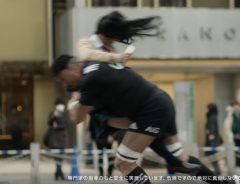- Source:
- © JAPAN Forward
- Tags:
- Rugby / Rugby World Cup / Scrum Unison
Related Article
-

Internet Reacts: Memes About Japan Beating South Africa At Rugby World Cup 2015
-

Take a Break From The Cup with Otterly Adorable Rugby Players at Hakkeijima Sea Paradise
-

South Africa Ends Japan’s One Team Winning Streak to Move On to 5th RWC Semi-Final
-

New Zealand All Blacks Tackle Schoolgirls Into Oblivion, Save Tokyo
-

Rowdy Rugby World Cup Fans Cause Crowd Surfing Stir On Tokyo Train
-

[VIDEO] England Says They’re Not Scared Of The All Blacks’ “Haka” Because They’ve Got THIS!



Hiroshi Yoshida, for JAPAN Forward, as featured on their new 2019 Rugby World Cup Portal
Visiting teams and their supporters who have come to Japan for the 2019 Rugby World Cup, to their surprise and delight, are being welcomed by local residents singing their visitors’ national anthems, thanks to the efforts of a former Japanese rugby star.
Scrum Unison, the grassroots choral group doing the singing, came into being largely through the efforts of Toshiaki Hirose, former captain of Japan’s national team and the professional Toshiba Fighting Lupus. The group’s unique effort is serving to enhance the rugby fever currently sweeping Japan and helping to ensure a successful World Cup.
Scrum Unison was launched earlier in 2019 with the avowed goal of welcoming foreign players and spectators coming for the World Cup with renditions of the visitors’ national anthems, sung by Japanese. Before the curtain rose on the big event on September 24, rugby players, fans, and other residents in close to 30 locales around Japan had already learned how to sing the national anthems of several of the participating teams.
Scrum Unison members (from L to R) Miri Tanaka, founder Toshiaki Hirose and Takumi Murata | © JAPAN Forward
Hirose’s brainchild dates back to his days as an active player. “When I was a member of the Japan national side, I was struck by how there was no culture among our team members of singing the Japanese national anthem ‘Kimigayo’ even though the teams that were winning would sing their own national anthems,” he recalled.
“So, we too started practicing singing the national anthem, and we got to the point where we could all sing together,” he said. “Singing along to the national anthem at international matches was something special, and that’s what made me decide on this course.”
Having come to realize the significance of singing national anthems as a player, even before retirement Hirose was thinking about how to put his preoccupation into action, starting with avid supporters of the Japan team.
“Since the culture of team members singing the national anthem in unison had taken root, to me the next step seemed to be to get visitors involved,” he said. “After I quit as a player, I thought it would be great if we could get fans singing along to the national anthems of visiting teams. Say during a match involving Scotland, the atmosphere was sure to be awesome. I wanted Japanese fans to be able to savor such an atmosphere.”
Although in political terms, Hirose’s example — Scotland — is only a part of the United Kingdom in which the role of England predominates, it is an independent “country” in terms of rugby and culture. And it is treated as such. At Murrayfield Stadium in Edinburgh, holy ground for Scottish rugby, it is a hallowed tradition for players and fans to sing as one with great emotion the folk song “Flower of Scotland.” The song stirs the souls of proud Scots patriots as a symbol of their determination not to be ruled by the English.
Well aware from his playing days of the importance of singing national anthems and the cultural background to the tradition, Hirose found the perfect opportunity for promoting his idea with Japan’s hosting this fall of the Rugby World Cup.
“I thought how great it would be if, besides just attending matches involving teams like Ireland and Scotland, Japanese could feel the thrill of singing their national anthems in unison,” Hirose said. “I felt it would be the best possible form of omotenashi (hospitality). I wanted others besides the Japanese team to be involved in welcoming people from various nations who come to Japan and demonstrate our feelings of respect for them.”
(...)
Written by Japan ForwardThe continuation of this article can be read on Japan Forward's
"2019 Rugby World Cup Portal":
‘Scrum Unison’ Serenades Rugby World Cup Teams with Their National Anthems